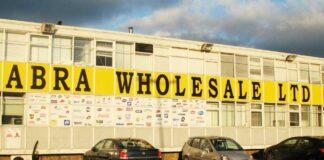In Ireland’s fiercely-competitive convenience market, wholesalers must either adapt and lead the way, or fall by the wayside. Savage & Whitten is a business that has continually changed to meet the needs of its customers. It was founded in 2000 when two similarly-sized businesses, J&E Whitten and Newry Cash & Carry, joined together to increase their growth.
By combining the two companies, which were both turning over around £6m, Savage & Whitten grew to £15m in 2005 when Mark Windebank took over the business. “It was a total change in direction for me. All my life I’d been involved in the textiles industry and it was a business that was increasingly going offshore,” he says.
“I made the right choice, and the business has performed tremendously well. When I joined, we delivered within a 30-mile radius; now, it’s within a 150-mile radius.” – Mark Windebank
Newry Cash & Carry, owned by the Savage family, opened up in 1916, so this month Savage & Whitten is running promotions and giveaways for its customers to celebrate 100 years in business.
“We’ve got Xboxes, TVs, hotel vouchers and family tickets to events, which our customers can pass on to their shoppers,” Windebank says. “A lot of other wholesalers in Today’s would do depot days, but we’re 100% delivered so we’ve got to do deals to promote.”
Phasing out the cash & carry side of the business in favour of delivered was a major change that Windebank oversaw to increase the depot’s efficiency. This allowed the layout of the depot to become more focused on deliveries and the rota to be changed, so that orders are collated, and stock is replenished during the day, and picked from 8:30pm.
“It’s difficult to have efficient picking when you have a warehouse that is also a shop. It’s not that long ago when we had picking and replenishing happening at the same time, and we were struggling to do 100 picks per hour. Now we’re achieving more than 220 per hour,” he says.
 The majority of the company’s growth has come from introducing retailers into the Today’s Group and helping to grow their businesses: “We started from zero stores in 2009 and at the end of this year, we’ll have 110 in Northern Ireland. We’ve also been developing into the Republic of Ireland where we will have 20 stores by the end of 2016.”
The majority of the company’s growth has come from introducing retailers into the Today’s Group and helping to grow their businesses: “We started from zero stores in 2009 and at the end of this year, we’ll have 110 in Northern Ireland. We’ve also been developing into the Republic of Ireland where we will have 20 stores by the end of 2016.”
These 130 Today’s stores now make up 50% of Savage & Whitten’s turnover, with the remaining 1,200 customers making up the rest. “As chairman of Today’s Group, I keep saying to my colleagues that they should work on a symbol offering. You see the huge benefit from growing that area,” Windebank says.
Savage & Whitten has been able to do this by investing in its team in the past six years, and spending a lot of time with individual retailers to make sure they’re the right fit. The firm has an in-house designer who makes digital layouts so that retailers can see what they will be getting from the transformation. “Before it was about sticking a sign above the door. Today, that’s the last thing we worry about,” he says.
Over the past year, Savage & Whitten has gradually brought in fresh, chilled and frozen lines, which now turn over £100,000 a week. Windebank says this would have been impossible without investing in electronic ordering. “It’s easy to invest in a chiller and a freezer facility; the real trick is to get the IT right. We are able to deliver the orders to our suppliers and have all our customers ordering online or through their EPoS systems.”
This ensures that when the products reach retailers’ shelves, they have the longest shelf life possible.
While 100% of chilled, fresh and frozen orders are electronic, only 65% of ambient orders come through digitally. “The future has got to be 100% online,” he says. “We see some bigger orders online once customers get used to it. The service becomes less about price and more about ordering ease. Price is a given, you have to be competitive, so it’s about becoming easy to do business with.”
Savage & Whitten has been working with fellow Today’s members Dee Bee, JW Filshill and Regal Wholesale to develop an app with IT firm Sanderson. The group plans to launch the app soon. “Bestway were the first into the market, and I know they’ve had great success. We’re working on something that we think will be even better than that,” Windebank says.
He concludes: “Our strength is that we can kit out and supply a range of different-sized stores. A third of our business is now in the Republic of Ireland, and that’s the growth area.”







